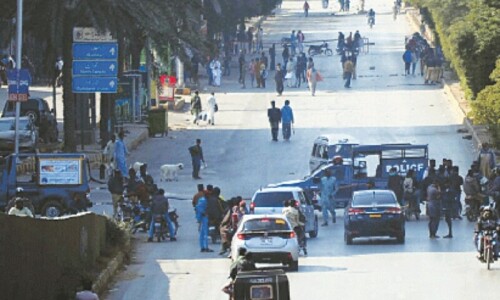KARACHI: Peaceful use of nuclear technology and its optimum utilisation holds the key to resolving energy-related woes of Pakistan besides helping the country achieve a sustainable solution to mitigate the climate change crisis.
This was the crux of the deliberations and discourse held during a seminar on ‘Peaceful Uses of Nuclear Energy’ held here, said a press release issued on Tuesday.
The event was organised by the Center for International Strategic Studies Sindh (CISSS) in collaboration with DHA Suffa University (DSU) and Millennium Institute of Technology and Entrepreneurship (MiTE) at the varsity auditorium.
The seminar was divided into plenary and core sessions.
MiTE Rector Prof Dr Huma Baqai chaired and opened the plenary session.
She elaborated that according to the government of Pakistan’s vision of producing 40,000 MW of electricity through nuclear power plants (NPP) by 2050 to fulfill a quarter of the total energy needs of the country is an appreciable landmark which needs to be pursued in the best national interest.
DSU Vice Chancellor Prof Dr Ahmed Saeed Minhas highlighted the importance of collaboration between national departments for achieving sustainable goals for the country.
The keynote address of the session was delivered by Khaqan Hassan Najeeb, former adviser of the finance ministry.
Explaining the economics of nuclear power, he said that in 2023, NPPs provided 17 per cent of the total electricity, which was an impressive success story and Pakistan needed more such good stories.
“The NPPs keep running for 70 to 80 years, which makes them a better option as compared to oil, gas, and coal powered plants. They run with over 80pc of the efficiency and capacity factor. The NPPs can run for 18 months without a break after every fuel load, which ensures energy security for the country,” he said.
Mr Khaqan closed his speech saying that by introducing a synergistic approach to energy planning, depth and substance in transformation and well-regulated market solutions, Pakistan could succeed in overcoming its energy woes.
Junaid Naqi, president of the Korangi Association of Trade and Industry (KATI), concluded the session with the remarks highlighting the role of NPPs, including four in Chashma and two in Karachi, providing over 3500 MW of clean energy to the national grid.
He also shed light on the role of nuclear energy being utilised by the Pakistan Atomic Energy Commission (PAEC) in radiopharmaceuticals, isotope production, non-destructive testing, water desalination etc., which offer venues for collaboration between industry, academia, public and private sectors.
“Energy fuels growth and growth empowers nations and use of atom for peace and development is the out of box solution that the country direly needs and KATI vows to extend its full support to every step taken to this effect,” he added.
The speeches followed by an interactive session in which students, media and stakeholders from industry asked pertinent questions from the panel of experts and got satisfactory responses.
The core session of the seminar was opened and chaired by former Ambassador Qazi M. Khalilullah, the executive director of the CISSS.
He said, “ Pakistan embarked upon peaceful uses of the nuclear technology about six decades ago. Pakistan is operating its NPPs under International Atomic Energy Agency’s safeguards and have a well-recognised record of safety and security in running its civil nuclear facilities.
“COP28 held in the UAE in 2023 and its recommendation to triple the nuclear capacity was a landmark event and similar pledge by 31 nations during COP29 held in 2024 further highlights the importance given to nuclear energy by the comity of nations in achieving zero carbon emissions target.
“Nuclear energy is clean as well as affordable. Small Modular Reactors (SMRs) and Micro Reactors, a sub class of SMRs, is the future of nuclear energy,” he added.
Later, Prof Shahida Wizarat elucidated on the subject of Nuclear Energy Economics in Pakistan.
She presented an overview of the challenges faced by Pakistan’s economy, the issue of Independent Power Projects (IPPs) as a root cause of the crisis faced by the country.
Published in Dawn, December 25th, 2024














































Dear visitor, the comments section is undergoing an overhaul and will return soon.